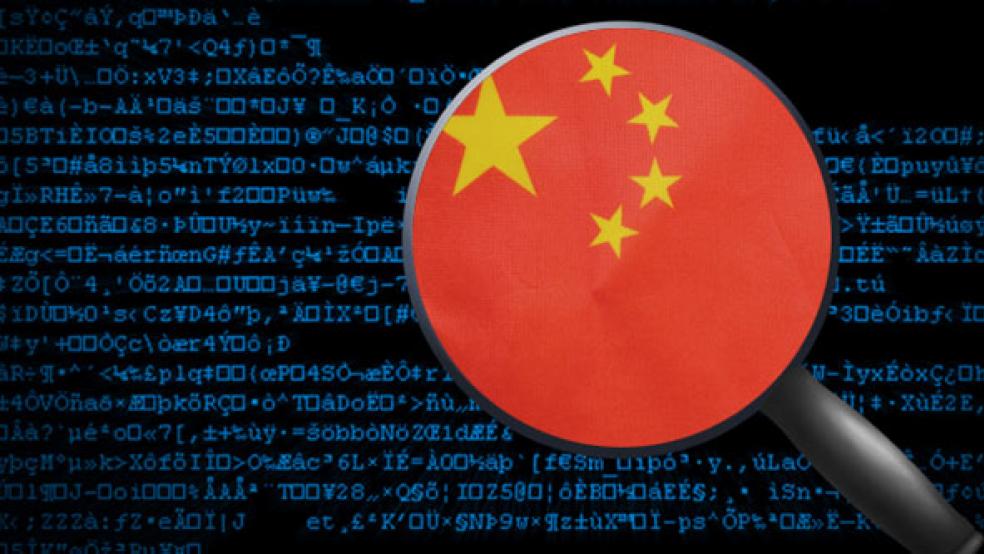Why is it so hard for the U.S. to clamp down on Chinese cyber theft? Because our businesses - those most damaged by hacking – are desperate for the growth that China can offer, and terrified they will be punished if they stand up to Beijing’s bullying.

An odd courtship ensues. Blackstone founder Steve Schwartzman recently announced that he will give $100 million to establish a scholarship for study at the prestigious Tsinghua University in Beijing. His gift is expected to be matched -- largely by donations from companies doing business in China; the hope is to raise $300 million in all. Mr. Schwartzman, forgive the expression, is sucking up.
Like participating donors JPMorgan Chase, Caterpillar Tractor and Boeing, the Blackstone Group is paying homage to China. The private equity behemoth has been a cautious investor in the country, wary of high valuations and uncertain exit opportunities, even as China has invested in Blackstone’s stock and its funds. Recently, Blackstone has been raising money to invest in China’s volatile real estate sector, where sell-offs have driven prices lower.
Like other private equity companies, Blackstone must operate within the limits set by the Chinese government, and deal with arbitrary rulings such as the decision last year to temporarily shut down new public offerings, the most common exit strategy for buy-out firms. Helping students to attend one of China’s premier schools is a worthwhile goal; at the same time, it doesn’t hurt to make friends in high places.
While Blackstone and other U.S. companies are busily currying favor with Beijing, the Obama administration’s overdue pushback on cyber theft may well undermine those efforts. Like gasoline siphoned from a tank, enormous intellectual capital has been stolen from the United States. As China has become increasingly brazen about its cyber intrusions – targeting not only businesses but government installations of all kinds, the U.S. is finally cracking down.
According to the Wall Street Journal, the Obama administration is considering penalizing China’s cyber mischief through possible sanctions, “indictments of Chinese nationals in U.S. courts” and cyber counter-maneuvers, “both attack and defense.” The Chinese have denied state responsibility for cyber intrusions, with a senior general reiterating that stance just this week after meeting with Martin Dempsey, Chairman of the Joint Chiefs of Staff.
At the same time, General Fang Fenghui described hacking as “serious as a nuclear bomb.” He is correct. Interference with our power grid or financial system could be devastating. Continued theft of our corporate secrets is just as costly. Challenging China takes some courage, but the time has come. China is looking just a tad vulnerable.
In the midst of their every-ten-year political reboot, China’s leaders face slowing growth, mounting pollution, rising labor costs, social unrest and shaky finances. Their nervousness about public criticism has led to a recent crack-down on corruption. High officials are suddenly eschewing fancy cars and designer goods in an effort to polish their image.
At the same time, there is mounting concern over the madcap spending that has propelled recent growth in China. A segment aired by CBS’ “60 Minutes” showed empty cities built in the effort to stave off the impact of the financial crisis. Concern about Beijing’s fiscal levitation was amplified in recent days by warnings from a senior Chinese auditor that local government debt is “out of control”, and could generate a more severe financial crisis than that brought on by the U.S. housing bubble. Just recently, Fitch lowered its rating on China’s sovereign debt. Moody’s signaled growing concerns as well by cutting its outlook to “stable” from “positive.”
China’s spending spree has failed to generate continued high growth. China’s GDP advanced at only 7.7 percent in the first quarter, a rate that would be welcome in most countries, but represents a deceleration for Beijing. That is the fourth consecutive quarter in which China’s economy advanced at less than an 8 percent annual rate. 2012 growth was a 13-year low.
On the plus side, China has continued to grow its share of worldwide trade, accounting last year for an estimated 11 percent of global exports, up from 9 percent before 2008. Their success comes in part from their ability to move upstream – replacing t-shirts and cheap handbags now produced in lower-wage countries like Vietnam with higher-value products like computers and auto parts.
The Wall Street Journal recently reported that China now employs more people in such higher-value industries than in textiles and leather goods. They also note that since 2010, China’s exports of electronics and other advanced products grew 24 percent to $129 billion, compared to $47 billion or a 5 percent jump in exports of clothes and shoes. That is a monumental shift, and one that has likely been made possible by accessing U.S. technology.
China must continue to grow to satisfy the needs of its increasingly demanding populace. It can only do so by generating internal consumer spending – a stated goal but tough slog- or by pushing upstream into higher-value products. This they will do, and they will steal U.S. technology to do it. It is time for the U.S. government, and U.S. corporations, to take the long view and get tough. This may be difficult for U.S. companies that operate in China on sufferance, but it is essential.
As the U.S. hardens its stance on cyber theft, Steve Schwartzman’s $100 million may prove one of the private equity mogul’s best investments to date – and that’s saying a good deal.





